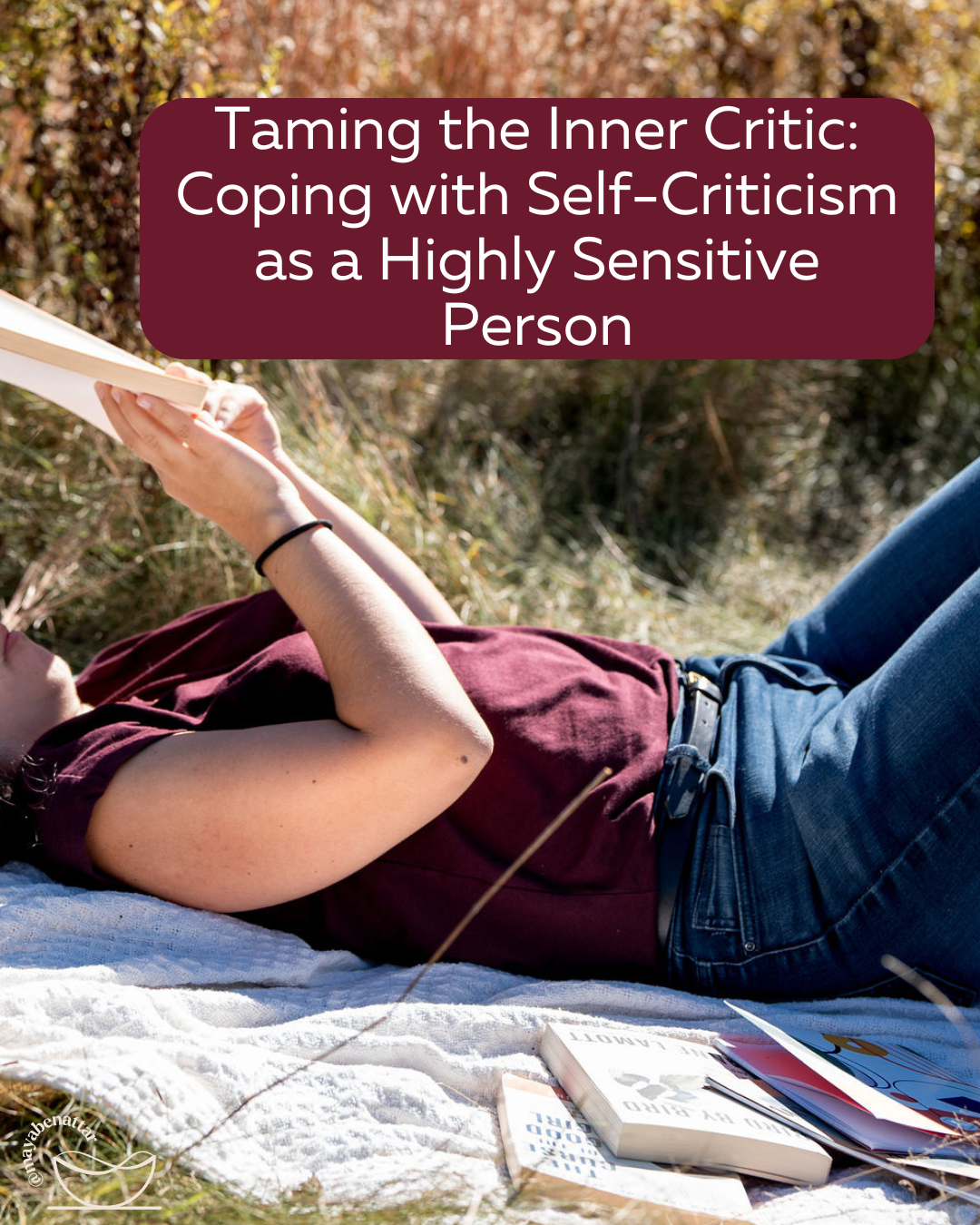Taming the Inner Critic: Coping with Self-Criticism as a Highly Sensitive Person
If you identify as a Highly Sensitive Person (HSP), you likely know what it’s like to feel deeply - joy, sorrow, beauty, pain. But that same depth can also turn inward, where it turns into something else: self-criticism.
Whether it's rehashing a comment you made at work, taking 3 hours to send 1 text, overanalyzing your parenting choices, or simply feeling like you're “too much” or “not enough”, the inner critic can be a constant companion - especially for highly sensitive women who experience anxiety.
But here's the truth: your sensitivity is not the problem. Self-criticism is a learned pattern. And the good news? You can learn a different way.
Why HSPs Are More Vulnerable to Self-Criticism
HSPs tend to:
· Process deeply. We reflect - sometimes too much - on what we’ve said or done.
· Feel emotions intensely. A small mistake can feel enormous.
· Have high empathy. We care deeply about how our actions affect others.
· Be perfectionistic. Many HSPs set unrealistic standards as a form of self-protection.
These traits aren’t flaws - they’re part of your sensitivity. But when mixed with anxiety, they can fuel a harsh inner dialogue that can be hard to quiet.
5 Ways to Cope with Self-Criticism as an HSP
Step 1: Name the Inner Critic
Start by simply noticing when the self-critical voice shows up. Give it a name if that helps - "The Perfectionist", "Ms. Not Enough", “The Bully”, or even just “The Critic.” Naming it creates space between you and the self-critical voice.
You might say to yourself:
"Ah, that’s The Bully again, telling me I’m failing. I see you and hear you, but I don’t have to believe you."
Step 2: Pause and Ground Yourself
When the critic kicks in, your nervous system probably responds with anxiety - tight chest, racing heart, clenched jaw.
Grounding techniques like:
· Deep breathing (inhale gently through the nose, exhale fully from the mouth)
· Touching a textured object (like a stone or fabric)
· Noticing 5 things you can see
· Humming (try it with me here for 2 mins)
…can help bring your body back to safety, so you can respond differently rather than react in the same patterns.
Step 3: Ask, “Whose Voice Is This?”
Often, the inner critic mimics voices from your past - parents, teachers, or cultural messages about how women or good kids “should” behave.
Ask yourself:
Who first made me feel like I had to be perfect to be worthy? Does this voice sound familiar?
This kind of reflection helps you untangle what’s truly yours and what you've unconsciously absorbed.
Step 4: Replace Judgment with Curiosity
Instead of “I messed up again”, try:
· “I wonder what made me feel so anxious in that moment?”
· “What need was I trying to meet by doing that?”
Curiosity opens the door to compassion. And compassion is what can begin to dissolve the grip of self-criticism.
Step 5: Create a Gentle Self-Talk Script and Playlist
Try writing a few go-to phrases you can say to yourself in tough moments. For example:
· “It’s okay to be imperfect. I’m still worthy.”
· “I did the best I could with what I knew.”
· “This is hard, but I’m learning.”
Read these aloud. Keep them in your phone. Post them on your mirror. You’re rewiring the way you speak to yourself - one phrase at a time.
You can also create a playlist to listen to in those tough moments. As a music psychotherapist I love helping clients figure out how to carry the creative self-exploration from our sessions into the rest of their lives – sometimes the easiest way to do that is through creating playlists. For my clients, it’s often songs/instrumental pieces we’ve used in sessions together.
But you can also create a playlist of a few songs/instrumental pieces that you connect with.
Try thinking of the musical qualities that connect to the feeling of gentle self-talk – maybe that’s soft, slow, warm. Maybe certain instruments feel gentler to you. Maybe there’s a song or two that feels gentle.
Try not to overthink this - set a timer for 10-15 minutes and just add a few pieces to a new Spotify playlist.
A Final Word
Remember – as an HSP, your depth is your strength. The world doesn’t need you to be harder or tougher. It needs you to be gentle with yourself, especially when that critical voice is loudest.
Healing your relationship with your inner critic isn’t about silencing her - it’s about leading with compassion, letting her know: You’re safe now. I’ve got you.
Looking for HSP therapy in NY? Let’s see if we’re a fit
If you’re feeling overwhelmed as a highly sensitive person in a chaotic world, you’re not alone. It can be tricky to get unstuck from unhelpful patterns and get your inner critic to stop shouting so loudly.
As a highly sensitive person myself, I know what’s it like to get stuck in overwhelming cycles of self-criticism - and how to step into feeling strong, capable and confident. My approach as a music psychotherapist can help you calm your overwhelmed nervous system, learn how to express yourself without exploding or shutting down, and stop judging yourself for being “broken” or “too much”.
If you’re interested in working together, you can learn more about me and schedule your free intro call for therapy today.
About the Author
Maya is a music therapist and psychotherapist in NYC and online across New York State. As a highly sensitive person herself, she has learned how to navigate this chaotic world while honoring her sensitivity and her needs.
She deeply enjoys working with highly sensitive people in her practice, helping them learn to calm their nervous systems, hold boundaries with less guilt, and express all of their feelings confidently. As an experienced music therapist she guides HSPs into a creative and embodied therapy experience - working with body, breath, and creativity as valuable tools for growth.
If you’re interested in working with Maya, you can learn more here or schedule your free intro call for therapy.
You don’t have to stay stuck - it’s time to reclaim your rhythm.



